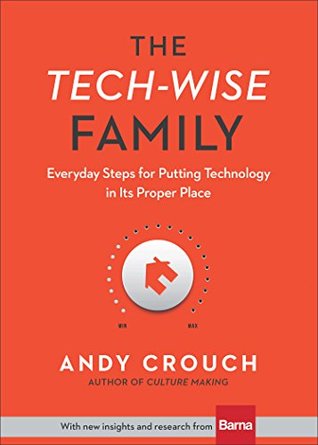More on this book
Community
Kindle Notes & Highlights
by
Andy Crouch
Read between
December 9, 2022 - January 8, 2023
When we let technology replace the development of skill with passive consumption, something has gone wrong.
This better way involves radically recommitting ourselves to what family is about—what real life is about. Our homes aren’t meant to be just refueling stations, places where we and our devices rest briefly, top up our charge, and then go back to frantic activity. They are meant to be places where the very best of life happens.
Build your life around not having a TV, and when you finally do have a TV, almost nothing will change.
We will have to teach our children, from early on, that we are not here as parents to make their lives easier but to make them better. We will tell them—and show them—that nothing matters more to our family than creating a home where all of us can be known, loved, and called to grow. And then we’ll have to make hard choices—sometimes radical choices—to use technology in a very different way from people around us.
Likewise, when we enjoy a nice restaurant meal on a Sunday, the enjoyment of that meal requires others to work. (Few people work, or toil, harder than restaurant workers.) If they have a regular day off on another day of the week, our leisure may not strictly require them to violate the principle of Sabbath. But even if their work is well balanced with rest, it’s still leisure for us: rest that requires others to work on our behalf.
But no amount of leisure can compensate for the sense that your life, whether poorly paid or well paid, is ultimately in vain.
So here is one result of our technology: we become people who desperately need entertainment and distraction because we have lost the world of meadows and meteors.
But overconsumption of distraction is just as unsatisfying, and ultimately sickening, as overconsumption of junk food.
The problem isn’t with our devices themselves—it’s with the way we use them. We simply have to turn off the easy fixes and make media something we use on purpose and rarely rather than aimlessly and frequently.
Except, of course, that’s exactly what character is made of—daily, slow, sometimes-painstaking steps toward handling everyday challenges with courage and grace. And these opportunities are not just for our children but for us too, figuring out how to cultivate our own patience and spark our own creativity as we deal with their sometimes unreasonable or impossible desires.
And as much as possible, we’ll sing at home, when friends and family gather, as we clean up the kitchen and fold the laundry, as we celebrate holidays like Christmas and Easter, when we get up in the morning and when we lullaby ourselves to sleep.
So the last, best commitment we can make in our mediated world is to show up, especially for the moments when we are most deeply human—which is to say, most deeply connected to our bodies.


